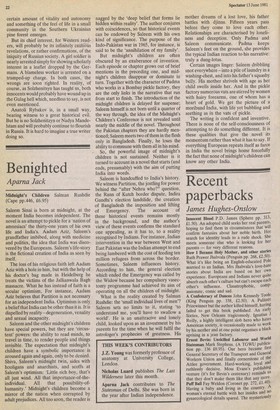Benighted
Aparna Jack
Midnight's Children Salman Rushdie (Cape pp .446, £6.95) Saleem Sinai is born at midnight, at the moment India becomes independent. The novel is an attempt to pickle for a 'nation of amnesiacs' the thirty-one years of his own life and India's. Aadam Aziz, Saleem's grandfather imbibed, along with medicine and politics, the idea that India was discovered by the Europeans. Saleem's life-story is the fictional creation of India as seen by itself.
The loss of his religious faith left Aadam Aziz with a hole in him, but with the help of his doctor's bag made in Heidelberg he treats the victims of the Jallianwala Bagh massacre. What he has instead of faith is a secular optimism, For instance, Aadam Aziz believes that Partition is not necessary for an independent India. Optimism is only a belief that India can be other than it is. It is dispelled by reality — degeneration, venality and sexual incapacity.
Saleem and the other midnight's children have special powers, but they are 'circustent' powers: the ability to read minds, to travel in time, to render people and things invisible. The expectation that midnight's children have a symbolic importance is aroused again and again, only to be denied. Shiva, Saleem's midnight twin, sides with hooligans and anarchists, and scoffs at Saleem's optimism: 'Little rich boy, that's all just wind. All that importance-of-theindividual. All that possibility-ofhumanity.' Midnight's children become a mirror of the nation when corrupted by adult prejudices. All too soon, the reader is nagged by the 'deep belief that forms lie hidden within reality'. The author conjures with coincidences, so that historical events can be endowed by Saleem with his own kind of significance. The purpose of the Indo-Pakistan war in 1965, for instance, is said to be the 'annihilation of my family'.
But midnight's children are often obscured by an exuberance of invention. Each episode or chapter grows out of brief mentions in the preceding one, and midnight's children disappear or dominate in turn. Together with the character of Padma who works in a Bombay pickle factory, they are the only links in the narrative that run from start to finish. The introduction of the midnight children is delayed for suspense; Saleem himself is not born until a quarter of the way through, the idea of the Midnight's Children's Conference is not revealed until nearly the middle of the novel. Throughout the Pakistan chapters they are hardly mentioned; Saleem meets two of them in the flesh only in Bangladesh. Finally, he loses the ability to commune with them all in his mind.
So, the powerful image of midnight's children is not sustained. Neither is it turned to account in a novel that starts (and ends, presumably) with the aim of putting India into words.
Saleem is handcuffed to India's history. We witness Partition, the jostling for power behind the "after Nehru who?" question, the Rann of Kutch border dispute, Indira Gandhi's election landslide, the creation of Bangladesh the imposition and lifting of Emergency. The account of these historical events remains mostly in the background, and the author's view of these events confirms the standard one appealing, as it has to, to a reality recognised by Indians. For instance, Indian intervention in the war between West and East Pakistan was the Indian attempt to end being lumbered with the cost of feeding ten million refugees from across the border. Sometimes, Saleem influences history. According to him, the general election which ended the Emergency was called by the WicloW because her compulsory vasectomy programme had achieved its aim of operating on all the children of midnight.
What is the reality created by Salman Rushdie: the 'small individual lives of men'? Saleem sets no limits to it, stating 'to understand me, you'll have to swallow a world'. He is an unattracive and lonely child, looked upon as an investment by his parents for the time when he will fulfil the astrologer's prophecies of greatness. His mother dreams of a lost love, his father battles with djinns. Fifteen years pass before they come to love each other. Relationships are characterised by loneliness and deception. Only Padma and Saleem communicate. Padma keeps Saleem's feet on the ground, she provides the typical Indian reaction to his narrative: truly a dung-lotus.
Certain images linger: Saleem dribbling snot everywhere — into a pile of laundry in a washing-chest, and into his father's squashy belly. His mother shrivels with age as her child swells inside her. And in the pickle factory numerous vats are stirred by women with hairy forearms, one of whom has a heart of gold. We get the picture of a moribund India, with life yet bubbling and seething as in the vats of pickle.
The writing is confident and inventive. There is none of the self-consciousness of attempting to do something different. It is these qualities that give the novel its momentum rather than what it has to say. If everything European repeats itself as farce in India the novel brings home forcefully the fact that none of midnight's children can know any other India.






































 Previous page
Previous page